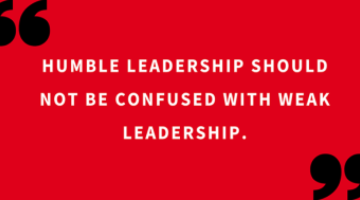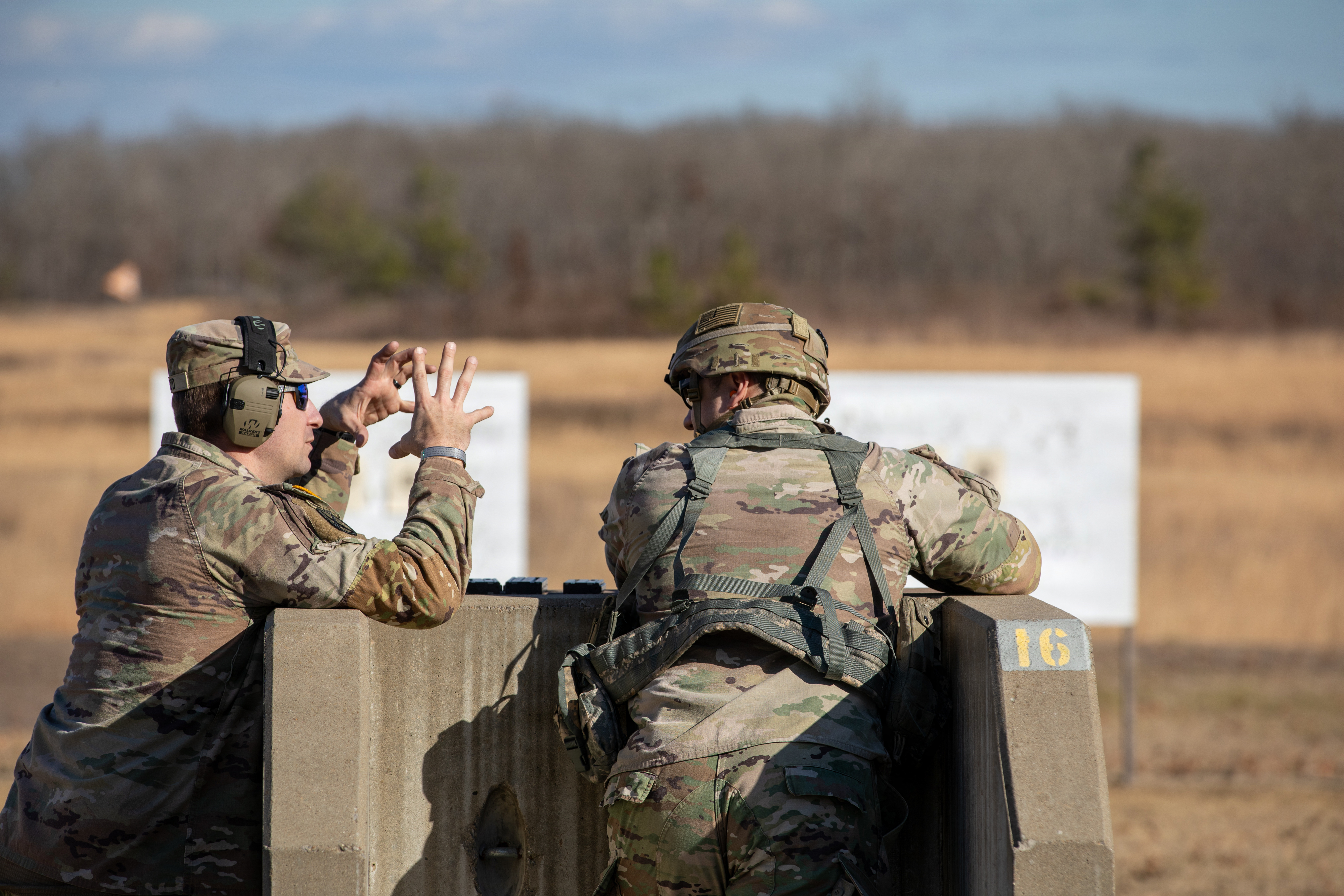How to Become a Humble Leader

The Army recently added humility to its leadership doctrine.[1] While some have questioned the utility of humility in the military, others have embraced it wholeheartedly, citing the numerous positive outcomes that have been pointed out in peer-reviewed studies. [2] For instance, humble leaders have been shown to impact their followers in several positive ways including increasing follower confidence, motivation, creativity, and information sharing, while reducing emotional exhaustion.[3] Recent work also suggests that humble leaders can positively influence their subordinates’ feedback seeking behavior – which may have implications for improving personal and professional growth.[4] And Brigadier General (Retired) Tom Kolditz’s work suggests that humble leaders can engender trust and loyalty in in extremis contexts – which seems like it might be handy in a profession like the Army![5]
The positive impacts shown to result from humble leadership are not limited to individual followers. The effects often extend to the larger organization to which the leader belongs. In fact, a growing body of literature indicates that leaders who possess humility can improve group and organizational performance and effectiveness. This positive impact on group performance can be traced to things like prosocial behavior or going out of one’s way to help another person. Research shows that humble people are more helpful than less humble people.[6] This can impact organizational citizenship behaviors like the willingness of employees to engage in mentoring, which has noted benefits we’ve discussed several times in different CJO pieces.[7]
So being a humble leader is good. That’s great! But what if you’re not humble? Are you destined for leadership failure? Of course not. But if you are interested in some of the benefits humility offers, like other character traits, humility can be developed. In one study, people’s humility was enhanced after a 7.5 hour workbook session that included reflection and writing exercises like answering open-ended questions about one’s experience with humility (e.g., “Is there anything different when two people act humbly toward each other versus when it only goes one way?”), and responding to videos about humility.[8] In another instance, expressing gratitude and awe in the form of journal entries increased individuals’ humility.[9] What is surprising is that there was a positive impact on individuals’ humility even when they didn’t have a goal of developing their humility (they didn’t know what the exercises were designed to do).
How to develop humility in yourself
If your desire is to become a humble leader, you’re already on the right track. Having the goal to improve your humility means you’re motivated to develop. If people can develop humility without expressly wanting to, imagine what you can do if you put your mind to it!
Beyond having a personal development goal, there are some specific things you can do to assist you in your development. While not an exhaustive list, there are some things you can do to positively influence your humility.
- Identify humble behaviors and engage in them. Through repetition, humility will become a habit.
- Seek out and emulate role models who exhibit humility.
- Request feedback from your subordinates, peers, and superiors, or trusted mentors, on your behaviors and discern if you’re expressing humility; if not, adjust your behavior.
- Express gratitude. Research shows that gratitude leads to humility.
How to develop humility in others
Good leaders focus not only on their own development but on the development of those who they lead. With this in mind, you can do a few specific things to help others become humble.
- Role model. Research suggests that humble leaders can inspire some of their subordinates to also act with humility, which isn’t surprising given followers often look to their leaders for guidance on how to behave.[10]
- Provide feedback. Mentors provide feedback and can help proteges enhance their self-awareness.[1] By taking an interest in your subordinates, you can offer suggestions and provide guidance to help them engage in humble behaviors.
- Reward humble behaviors. Publicly recognize or reward those who engage in humble behaviors, this will help foster a creative culture in the teams and organizations you lead.
Humility has been shown to help make leaders more effective. If you are exploring self-development options for your own improvement, focusing on developing your humility is something you might consider. As a leader, you should also focus on developing others – so don’t lose sight of helping those around you develop their humility. We wish you luck on your journey – and welcome any insights you gain along the way.
Colonel Jordon Swain is the Director of the Center for Junior Officers and has course directed the core Leadership course at West Point. He holds a Ph.D. in Organizations and Management from Yale University and an MBA from the Wharton School. COL Swain has published on multiple topics related to leader development including leader humility, mentoring, and humor’s impact on leadership effectiveness.
———
[1] ADP 6-22. https://armypubs.army.mil/epubs/DR_pubs/DR_a/pdf/web/ARN20039_ADP%206-22%20C1%20FINAL%20WEB.pdf
[2] Full disclosure – Some colleagues and I are researching the impact of leader humility in the Army. More to follow on what we’ve found so far!
[3] Mao, J., Chiu, C. Y., Owens, B. P., Brown, J. A., & Liao, J. (2019). Growing Followers: Exploring the Effects of Leader Humility on Follower Self‐Expansion, Self‐Efficacy, and Performance. Journal of Management Studies, 56(2), 343-371.
Wang, Y., Liu, J., & Zhu, Y. (2018). Humble leadership , psychological safety, knowledge sharing and follower creativity: A cross-level investigation. Frontiers in Psychology, 9, 1727.
Gonçalves, L., Ribeiro, P., & Rego, A. (2015, June). How leaders’ humility predict team creativity: An empirical study. Paper presented at the IMC 2015 International Management Conference, Bucharest, Romania.
Wang, J., Zhang, Z., & Jia, M. (2017). Understanding how leader humility enhances employee creativity: The roles of perspective taking and cognitive reappraisal. The Journal of Applied Behavioral Science, 53(1), 5-31.
[4] Qian, J., Li, X., Song, B., Wang, B., Wang, M., Chang, S., & Xiong, Y. (2018). Leaders’ expressed humility and followers’ feedback seeking: The mediating effects of perceived image cost and moderating effects of power distance orientation. Frontiers in Psychology, 9.
[5] Kolditz, T. A. (2010). In extremis leadership: Leading as if your life depended on it (Vol. 107). John Wiley & Sons.
[6] LaBouff, J. P., Rowatt, W. C., Johnson, M. K., Tsang, J. A., & Willerton, G. M. (2012). Humble persons are more helpful than less humble persons: Evidence from three studies. The Journal of Positive Psychology, 7(1), 16-29.
[7] Swain, J. E., Kimball, R., & Steilage, A. J. (2019). Mentoring for leaders of character. In Smith, Swain, Brazil, Cornwell, Britt, Bond, Eslinger, and Eljdid (Eds.), West Point leadership. New York, NY: Rowan Technology Solutions.
[8] Lavelock, C. R., Worthington Jr, E. L., Davis, D. E., Griffin, B. J., Reid, C. A., Hook, J. N., & Van Tongeren, D. R. (2014). The quiet virtue speaks: An intervention to promote humility. Journal of Psychology and Theology, 42(1), 99-110.
[9] Kruse, E., Chancellor, J., Ruberton, P. M., & Lyubomirsky, S. (2014). An upward spiral between gratitude and humility. Social Psychological and Personality Science, 5(7), 805-814.
Ruberton, P. M., Kruse, E., & Lyubomirsky, S. (2016). Boosting state humility via gratitude, self-affirmation, and awe: Theoretical and empirical perspectives. Handbook of humility. New York: Routledge.
[10] Carnevale, J. B., Huang, L., & Paterson, T. (2019). LMX-differentiation strengthens the prosocial consequences of leader humility: An identification and social exchange perspective. Journal of Business Research, 96, 287-296.
Owens, B. P., & Hekman, D. R. (2016). How does leader humility influence team performance? Exploring the mechanisms of contagion and collective promotion focus. Academy of Management Journal, 59(3), 1088-1111.
Rego, A., Owens, B., Leal, S., Melo, A. I., e Cunha, M. P., Gonçalves, L., & Ribeiro, P. (2017). How leader humility helps teams to be humbler, psychologically stronger, and more effective: A moderated mediation model. The Leadership Quarterly, 28(5), 639-658.



